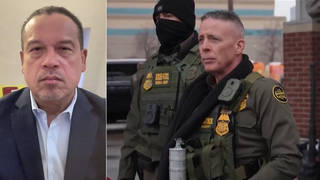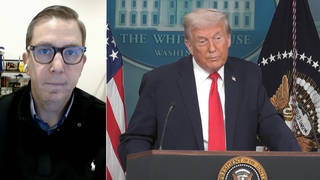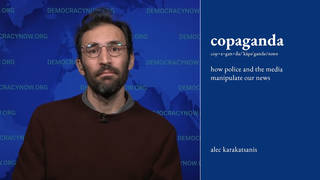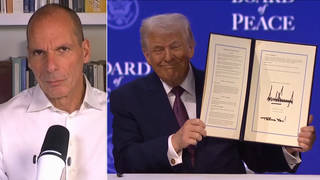
On Tuesday, Donald Trump addressed the United Nations General Assembly at its headquarters in New York City, criticizing the international governing body, immigration and the science of climate change, while boasting about his presidency and the military power of the United States. In what became the longest U.N. speech ever made by a U.S. president, Trump bragged about ending “seven unendable wars” and said countries that do not crack down on immigration “are going to hell.” “Trump was speaking to a far-right international around the world,” says Washington Post journalist Ishaan Tharoor, who has covered all of Trump’s U.N. speeches since his first term in office.
This year’s UNGA was also marked by the growing recognition of Palestinian statehood by member nations. Western countries including France and the U.K. broke with decades of precedent in doing so, making the U.S. the only member of the U.N. Security Council not to recognize a Palestinian state. Tharoor comments on the significance and limitations of these announcements, and on Trump’s relationship with Brazilian President Luis Inácio Lula da Silva, who opened the UNGA just before Trump spoke.
Transcript
AMY GOODMAN: Speaking at the opening of the U.N. General Assembly Tuesday here in New York, President Trump blasted the United Nations, saying it’s, quote, “not even coming close to living up to its potential,” unquote. Meanwhile, Trump claimed he himself has ended seven wars.
PRESIDENT DONALD TRUMP: In a period of just seven months, I have ended seven unendable wars. They said they were unendable. I’m very honored to have done it. It’s too bad that I had to do these things instead of the United Nations doing them. And sadly, in all cases, the United Nations did not even try to help in any of them.
AMY GOODMAN: Trump also called climate change a “con job” and warned European nations of the, quote, “double-tailed monster” of migration and green energy.
PRESIDENT DONALD TRUMP: When your prisons are filled with so-called asylum seekers who repaid kindness — and that’s what they did: They repaid kindness with crime — it’s time to end the failed experiment of open borders. You have to end it now. Let’s see, I can tell you. I’m really good at this stuff. Your countries are going to hell.
AMY GOODMAN: Meanwhile, antiwar protesters gathered outside the United Nations, urging an end to Israel’s war on Gaza, coming as at least 10 countries recognized Palestinian statehood this week, bringing the number of countries at the United Nations who have recognized the country of Palestine to about 150.
For more, we’re joined by journalist Ishaan Tharoor. He is global affairs columnist at The Washington Post, where his latest columns are headlined “Trump vs. Lula was a window into MAGA at the U.N.” and “A Trump-shaped wrecking ball swings toward a faltering United Nations.”
Welcome back to Democracy Now!, Ishaan. It’s great to have you with us. Why don’t you comment, overall, on President Trump’s address yesterday?
ISHAAN THAROOR: Sure. Well, it’s a pleasure to be back with you, Amy.
I’ve covered every single one of Trump’s U.N. speeches, from his first term until now. And I think it’s fair to say, in his first term, he was a bit of an object of curiosity, his appearances on the U.N. You remember many moments of levity, of the audience laughing, or laughing at him, sometimes with him. And I think there was an overall overarching impression among the U.N. diplomatic corps that this is an aberration, perhaps; this is a particular interlude in American politics. And now with Trump’s return this year, it’s very clear that he represents a certain status quo, or an emerging status quo.
And in Trump’s speech, as you highlighted his — the two very coherent points he made was about the perils of migration and the mistake, in his mind, of green climate policies. And he’s speaking not just to his base, but to an emerging far-right base across the West. He warned about the death of Western Europe. And that’s a — this is all highly unusual rhetoric to have from the dais of the General Assembly, where you’re supposed to be, as the largest underwriter of the United Nations, as a prominent member state, talking about the ways in which, you know, global cooperation can solve major global challenges. But that is not something Trump cares about. And it became abundantly clear, especially as his speech went on and on and on and on, four times beyond the allotted time for him.
AMY GOODMAN: Over an hour. It’s generally about 15 minutes?
ISHAAN THAROOR: It’s generally 15 minutes, correct. That, you know, Trump was speaking to a far-right international around the world more than he was to the member states there in the room.
JUAN GONZÁLEZ: And, Ishaan, you mentioned this — I think it was the longest speech ever, U.N. speech, by an American president. And it almost seemed at times this — the narcissism and the lecturing of world leaders. What do you think was the impact on them, especially when he talks about migration as it’s primarily a European problem, when the reality is that many countries in the Global South — Iran, Turkey, Colombia — are hosting huge numbers of refugees and migrants, as well?
ISHAAN THAROOR: That’s right. You know, the length of the speech was something that an Arab diplomat texted me during the speech saying, “This reminds me of Gaddafi, more than anybody else, at the United Nations.” Of course, the late Libyan dictator was somebody who came to the U.N. and spent a lot of time kind of amusing the audience and going on and on and on.
And Trump, yes, he had — he had his usual moments where he’s talking about a faulty teleprompter and the escalator that didn’t work, and then, you know, offering some strange asides here and there. But absolutely, he came to United Nations, a forum that’s supposed to, in its function, grapple with problems that all countries share or that cross borders, and here he is talking about how to shut down borders. Here he is talking about the waste of time of the United Nations, and reviving, in many ways, long-standing Republican complaints about the U.N. that predate Donald Trump, but which, you know, Donald Trump has really accelerated a certain conversation in the United States about the U.S.'s commitments to this institution, about the U.S.'s commitments, in general, to the general ethos and principles of multilateralism, which is what the U.N. stands for.
And so, it’s kind of accelerated us — accelerated the sense of an inflection point now. The U.N. is 80 years old. It’s fair to say that it’s showing its age. It’s not been able to resolve conflicts for a long time. It’s struggling to maintain the peace. It’s struggling, in many ways, to fulfill some of its core mission and goals. The U.S. cuts that Trump has initiated to USAID and other programs are deeply damaging to the U.N. system and the international humanitarian system, as well.
And so, you’re seeing a very beleaguered U.N. Secretary-General António Guterres entering his final year. And while he maybe — may want to sort of position the U.N. for a future where it has to reckon with climate change, where it has to figure out the rules of the road internationally for things like AI and other advanced technologies, instead of positioning the U.N. for the future, he’s in the midst of a really brutal regime of austerity and retrenchment and major cuts to come next year.
JUAN GONZÁLEZ: And what about this claim of Donald Trump that he ended seven unendable wars that the United Nations was unwilling to get involved with? Could you fact-check that for us a little bit?
ISHAAN THAROOR: Right. I mean, I think you can go through each seven of them — and forgive me, I don’t have them all itemized in my head at this point, but my colleagues at The Washington Post have already fact-checked them. I think it’s fair to say that in all seven instances that he cited, either there was no actual war to be resolved, or the war is still raging.
You know, he talked about this peace deal that was brokered between the DRC and Rwanda, which is backing rebels in eastern Democratic Republic of Congo. Just yesterday, you had the president of the DRC here in New York saying, “Actually, the fighting is worse than it’s ever been right now.”
The conflict between India and Pakistan, the Pakistanis recognize that telling Trump that he stopped the conflict was great for them, because that’s all he wanted to hear, but the Indians have a totally different narrative, and it has nothing to do with Trump ceasing hostilities. And the list goes on.
What’s curious, though, is in the past, in his first term, when he would tout his achievements, that would often elicit, you know, audible laughter in the room of the General Assembly. This year, when he is patting himself on the back, declaring, you know, basically saying, “Look, I’m the great peacemaker. Nothing is — you know, I’m the great builder of the American economy,” no one’s — and speaking in his customary superlatives, there was pindrop silence. And that’s partially because some of those leaders in this room have felt compelled to endorse him for the Nobel Peace Prize, who have felt compelled to kind of get with the program as authored by Washington.
AMY GOODMAN: Ishaan, I wanted to go to the scene in the room. You wrote, “A senior foreign diplomat posted at the UN texts me: 'This man is stark, raving mad. Do Americans not see how embarrassing this is?'” And there was a problem with the teleprompter for President Trump, and White House Press Secretary Karoline Leavitt told Fox News’ Jesse Watters that it looked like sabotage, and she would personally see to it that there would be accountability. And Senator Mike Lee, the Republican from Utah, called for defunding the U.N. for, quote, “orchestrating escalator and teleprompter malfunctions.” Because we should say, before the teleprompter malfunction, he had to read from his script before it went back on. As he and Melania Trump went up the escalator, it stopped. But it turned out, according to a U.N. official, that someone from the president’s party who ran ahead of him inadvertently triggered the stop mechanism on the escalator. Talk about those two moments.
ISHAAN THAROOR: Right. Well, I mean, you mentioned Senator Mike Lee. Senator Mike Lee has already put forward legislation earlier this year to fully defund the United Nations and to pull the U.S. out of the U.N. So, the fact that he’s seizing on this episode to justify his long-standing — you know, to grind his long — his ax is funny.
AMY GOODMAN: I wonder if he’s also calling for defunding the White House, because, according to the U.N., the White House was operating Trump’s teleprompter.
ISHAAN THAROOR: Exactly, yeah. So, it appears that the teleprompter that Trump complained about on the world stage at the dais of the General Assembly was operated by the White House and was malfunctioning probably because of some error within his team. You heard the president of the General Assembly, Annalena Baerbock, say immediately afterwards that “Because of a lot of queries we’re getting from delegations, we can confirm that there’s nothing wrong with the teleprompter. They’re working — it’s working perfectly.” And that was a discreet but very clear moment. And it didn’t seem, thereafter, that any of the world leaders who spoke after Trump had any issues there, either, yeah.
JUAN GONZÁLEZ: Yeah, I wanted to ask you: On the 80th anniversary of the United Nations, again, a body that the United States was a prime mover of creating, and is still providing a significant percentage, the biggest percentage, of the collective U.N. budget, what does all the — what does this attitude of the Trump administration mean for that world body?
ISHAAN THAROOR: Well, the Trump administration’s view is that the U.N. is too big and does too much, and it should be — its function should be pared down to focus more exclusively on solving conflict. That’s their general premise of how they approach the U.N. They have a lot of particular bees in their bonnet about wings of the U.N. system. They’ve pulled the U.S. out of the WHO, UNESCO, the U.N.’s cultural agency. They have — they see whole aspects of the U.N. system as kind of irredeemably biased, anti-Israel.
And I think this is not new. This has been a long-standing U.S. suspicion and complaint. Reagan pulled the U.S. out of UNESCO in the '80s. But successive U.S. administrations have long understood that the U.N. is a value add for American power. It's a platform for the U.S. to meet the world, for the U.S. to be present at every conversation. It matters for an idea of American power that the U.S. is the kind of guarantor of the U.N.
But that no longer is the view, the abiding view, among Republicans. And there’s, in general — and this is — this is in keeping with Trump’s own political style and foreign policy worldview — there’s a suspicion of having to operate in these kinds of institutions in the first place. He prefers transactional, bilateral dealmaking. The U.N. is not about that kind of dealmaking. The U.N. is a multilateral forum. And so there’s a kind of clash between the MAGA worldview and the whole ethos of the U.N., and it’s almost irreconcilable.
AMY GOODMAN: The big news of the week is France, Portugal, Britain, Australia joining somewhere near 150 other countries, member states of the U.N., in recognizing the state, the country, of Palestine. Trump repeated his criticism of their action.
PRESIDENT DONALD TRUMP: Some of this body is seeking to unilaterally recognize a Palestinian state. The rewards would be too great for Hamas terrorists for their atrocities. … This could have been solved so long ago. But instead of giving in to Hamas’s ransom demands, those who want peace should be united with one message: release the hostages now. Just release the hostages now.
AMY GOODMAN: The United States now becomes the only member of the U.N. Security Council not to recognize the state of Palestine. The significance of what Trump said?
ISHAAN THAROOR: It’s hugely significant in that, I mean, we’ve seen over the course of this hideous conflict the U.S.'s isolation and — U.S. and Israel's isolation deepening on the world stage. You’ve seen all these governments, especially now in Western Europe, recognizing that — no one’s under the illusion that making this move creates a Palestinian state, but it shows a level of political commitment to the Palestinians that many believe is necessary, and it’s a reminder to Israel that what Israel is doing won’t be ignored. And the extent to which Israel is basically destroying the conditions for a Palestinian state, in the minds of a lot of European diplomats I’ve spoken to, there has to be some kind of consequence to it.
Now, I think you could turn around and say the fact that, you know, the U.N. — the U.S. has blocked Palestinian President Mahmoud Abbas from even coming to the U.N. this year, that it sort of just scoffs at these kinds of moves, it does also illustrate a bit of the weakness of the U.N. system, that you have a veto-wielding Security Council member just standing in the middle, standing in the way of any kind of political progress at the U.N. on this issue. And it shows, to a certain extent, the fact that, you know, for all our discussions of a post-American world or the decline of American power, if the U.S. wants to position itself in an antagonistic way, it still will get what it — it still will be effective.
AMY GOODMAN: I want to end where the U.N. General Assembly began, as it does every year, with Brazil. In Trump’s U.N. address, he said he interacted briefly with the Brazilian President Luiz Inácio Lula da Silva, who spoke before him, gave the opening address at the General Assembly. Trump said the two will meet soon. Trump said the two had, quote, “excellent chemistry,” saying, “It’s a good sign.” This comes after Trump imposed new 50% tariffs on Brazilian imports over the prosecution of former Brazilian president, Trump ally Jair Bolsonaro. Earlier this month, Brazil’s Supreme Court sentenced Bolsonaro to more than 27 years in prison for plotting a military coup after his election defeat in 2022. Trump also sanctioned the Supreme Court justice who led the probe into Bolsonaro, now, as well, sanctioned the judge’s wife. President Lula opened the U.N. General Assembly just before Trump spoke.
PRESIDENT LUIZ INÁCIO LULA DA SILVA: [translated] There is no justification for unilateral and arbitrary measures against our institutions and our economy. The attack on the independence of the judiciary is unacceptable. This interference in internal affairs is aided by a subservient far right that longs for its former hegemony. … Before the eyes of the world, Brazil sends a message to all aspiring autocrats and those who support them: Our democracy and our sovereignty are nonnegotiable.
AMY GOODMAN: Ishaan Tharoor, your final response on the significance of what Lula said?
ISHAAN THAROOR: Well, it was a very striking set piece to have Lula precede Trump, to have Lula almost directly attack the United States for its unilateral actions against Brazil. He spoke about the meticulous way in which the judiciary has operated in Brazil and the unfairness of the U.S. bullying of Brazil. He also — you know, he has spent many interviews telling us that if Trump was Brazilian, he would be under arrest and perhaps imprisoned for his role in the January 6, 2021, insurrection at the Capitol, and that it’s a testament to Brazilian democracy, as opposed to American democracy or the American system, that Bolsonaro received the justice that he did.
Now, if there’s going to be some kind of softening or thaw, it’s unclear. I have heard from the Brazilians that there are no immediate plans for Lula and Trump to meet. So, whatever Trump touted from the General Assembly, it’s a bit unclear if there will be any follow-through from that.
AMY GOODMAN: Ishaan Tharoor, I want to thank you very much for being with us, global affairs columnist at The Washington Post. We’ll link to your pieces, among them, “Trump vs. Lula was a window into MAGA at the U.N.” and “A Trump-shaped wrecking ball swings toward a faltering United Nations.”
Coming up, we look at the Trump administration’s claims about autism and vaccines. We’ll look at Trump’s war on science with Dr. Peter Hotez. Stay with us.
[break]
AMY GOODMAN: “The Demagogue” by Lila Downs in our Democracy Now! studio.













Media Options